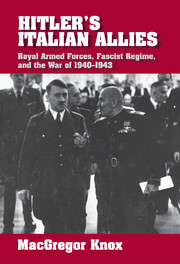Book contents
- Frontmatter
- Contents
- Acknowledgements
- List of Abbreviations
- Map
- Introduction: Defeat – and Humiliation
- 1 Fascist Italy's Last War
- 2 Society, Politics, Regime, Industry
- 3 Men and Machines: The Armed Forces and Modern Warfare
- 4 Strategy
- 5 Operations
- 6 Tactics
- Conclusion: The Weight of the Past
- Chronology
- Bibliographical Note
- Index
4 - Strategy
Published online by Cambridge University Press: 19 January 2010
- Frontmatter
- Contents
- Acknowledgements
- List of Abbreviations
- Map
- Introduction: Defeat – and Humiliation
- 1 Fascist Italy's Last War
- 2 Society, Politics, Regime, Industry
- 3 Men and Machines: The Armed Forces and Modern Warfare
- 4 Strategy
- 5 Operations
- 6 Tactics
- Conclusion: The Weight of the Past
- Chronology
- Bibliographical Note
- Index
Summary
Fascist Italy's approach to the art of matching ends and means in war, and its machinery for strategic decision making, were predictably eccentric – although less so than that of its German ally, where the dictator's power, by autumn 1942, had melted and consumed such vestiges of professional autonomy as remained to the Prusso-German army after its decapitation in 1938. At the outset Mussolini induced Victor Emmanuel III to delegate at least in part the royal prerogative of the supreme command: as of 11 June 1940 the Duce was officially commander of “the troops operating on all fronts.” He took that precarious appointment – sanctioned by a mere proclamation rather than a royal decree with legal force – as a license to commit strategic folly despite his limited control over the internal mechanisms of the armed forces. That ambiguity, which reflected the dualism at the heart of the Italian state, was characteristic of the regime.
Immediately under Mussolini, a chief of general staff (from 1925 to December 1940, Marshal Pietro Badoglio) advised the Duce on strategic issues and war preparation, and was at least theoretically answerable for interservice coordination. After 4 June 1940, under a characteristically vague charter that Mussolini had drawn up, Badoglio was also responsible for translating the Duce's strategic directives into orders for each of the armed forces, and for ensuring the services' timely and coordinated employment. In that capacity, Badoglio called and chaired a series of meetings of the service chiefs of staff at which some limited discussion of strategic issues occurred – but always with an eye to the Duce, who often read the minutes.
- Type
- Chapter
- Information
- Hitler's Italian AlliesRoyal Armed Forces, Fascist Regime, and the War of 1940–1943, pp. 69 - 110Publisher: Cambridge University PressPrint publication year: 2000

